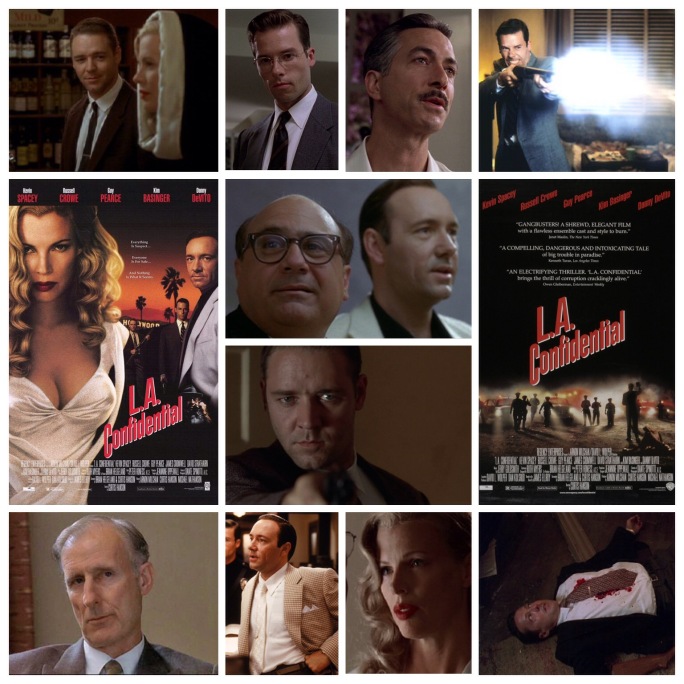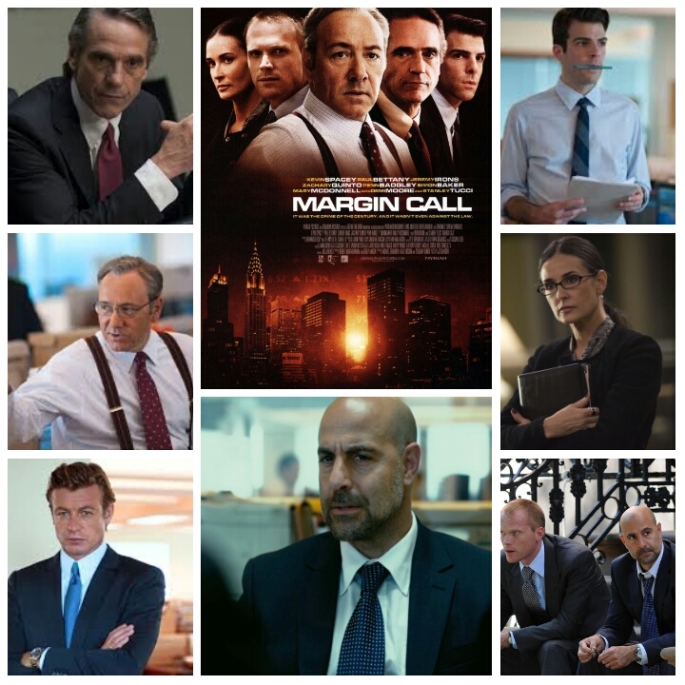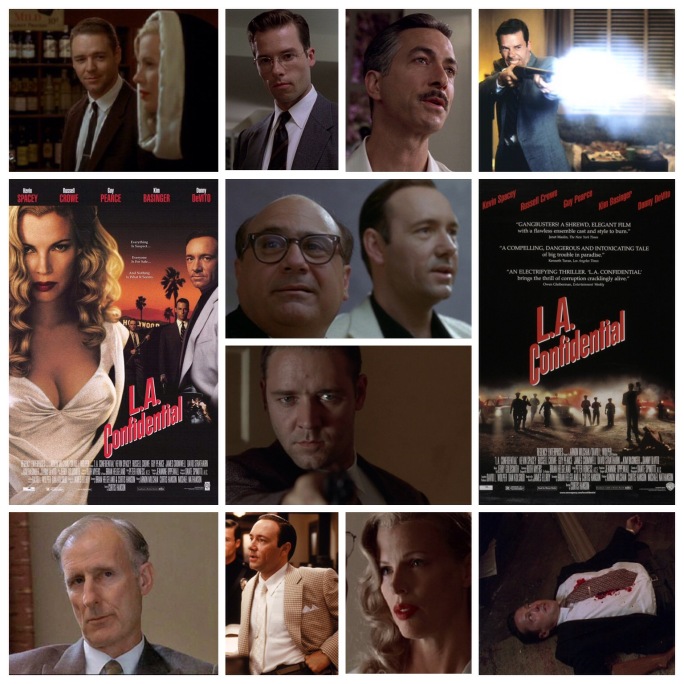
The finest Los Angeles film noir to ever come out of Hollywood, Curtis Hanson’s L.A. Confidential is a serpentine wonder, a two and a half hour parade of hard boiled detectives, sultry dames and shady dealings, all wrapped up in a multiple murder story that kicks everyone’s arc into gear, taking you places you didn’t think you’d see some of these people go. ‘Triple homicide at the nite owl’, barks the headline of a gossip rag run by a sleazy Danny Devito, and indeed the crime scene has everyone buzzing, from the shirt tuckers in the highest ranks of the LAPD, to the burly brass knuckle wearers on the brutish task force. Something is amiss with the case, and Sgt. Edmund Exley (Guy Pearce) is a dogged straight arrow with a nose for corruption. He isn’t quite the formidable force needed to barge down certain doors or break certain bones though, and that’s where Det. Bud White (Russell Crowe) comes into play. The two are initially at each other’s throats following a cleanse of many of the department’s corrupt officers, spurred by Exley himself. It soon becomes clear that they have no choice but to work together, in order to smoke out the evil source of the crime, which may be closer to home than anyone thought. Crowe and Pearce were not the stars they are now back then, but came up from the farm league in sensational style, barging onto the Hollywood scene in shotgun toting, shit kicking style. Kim Basinger won an Oscar for her poised, complex turn as a call girl who works for a pimp named Pierce Patchett (a glib David Strathairn), an eccentric who pays surgeons to deck his girls out to look like movie starlets. My favourite performance in the film comes from a diabolical James Cromwell as Captain Dudley, a dangerous rogue who you don’t want to cross for fear of his unpredictability. Kevin Spacey is all style and self loathing as Jack Vincennes, a media mogul of a cop who advises on TV shows and hogs the press limelight like a boorish politician. The supporting cast is all across the board, including work from Simon Baker, Graham Beckel, Tomas Arana, Ron Rifkin, Brenda Bakke, Jack Conley and an amusing cameo from Paul Guilfoyle as Mickey Cohen. Adapting a novel by the great undisputed king of LA noir, James Ellroy, Hanson weaves a deadly web of sensation, intrigue and steamy goings on that never follows a readily discernable pattern of narrative, and constantly has tricks up it’s sleeves. Remember Rollo Tomassi.
Tag: Simon Baker
LAND OF THE DEAD – A REVIEW BY J.D. LAFRANCE
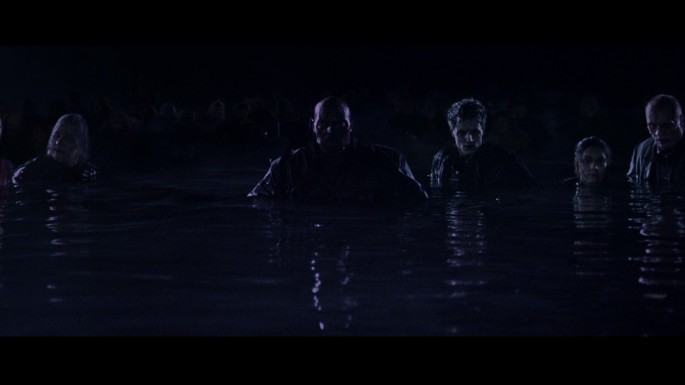
The 2000s saw a resurgence in the zombie film with the good (28 Days Later), the bad (Resident Evil) and the funny (Shaun of the Dead), but all of them pale in comparison to George A. Romero’s trilogy of zombie films. The first two have been remade already, most significantly with Dawn of the Dead (2004), and both failed to build on or even recapture what made Romero’s films so great in the first place. They seem to only be in love with the gore and miss (or just didn’t understand) the socio-political message of them. Romero returned with a zombie movie that was years in the making and was well worth the wait.
As with his other zombie films, Land of the Dead (2005) is a stand-alone story but looks like it could exist in the same universe as the others. The zombies have completely taken over and the dwindling human population tries desperately to hold onto what little land they have left. A small, heavily armed group venture regularly into zombie territory to scavenge whatever supplies they can find and then return to an island complex known as Fiddler’s Green. The island has been heavily fortified by the military who rule with complete control with rich businessman Kaufman (Dennis Hopper) as their leader.
Society has degraded even further since Day of the Dead (1985). The wide gulf between the rich and the poor is even more pronounced. In the slums of the city people can get their pictures taken with captive zombies or shoot them with paintball guns. At one point, they even throw a woman (Asia Argento) into a steel cage with two zombies for sport. The rich people aren’t much better as represented by Kaufman who is corrupt and amoral enough to make money off of and sacrifice his own people. It’s as if Romero’s saying that it wouldn’t be so bad if the zombies wiped us out. Look at what we’ve become.
The glimmer of hope is represented by Riley (Simon Baker), the leader of the scavengers and his sidekick and ace sharpshooter Charlie (Robert Joy). Like the protagonists in Romero’s Dead trilogy and Knightriders (1981), Riley is a reluctant leader who is tired of this corrupt world and is quietly planning an escape route to a more natural way of life. However, this is disrupted by another member of his group, Cholo (John Leguizamo), who represents the dissenting voice. He’s only in it for the money and has a secret pact going with Kaufman. However, when Kaufman rips off Cholo, the mercenary goes rogue and takes off with Dead Reckoning, the island’s heavily armored vehicle. So, Kaufman cuts a deal with Riley to find Cholo, kill him and bring back the vehicle.
To make matters worse, the zombies are getting smarter as exemplified by Big Daddy (Eugene Clark) who not only learns how to use a gun but is also able to organize legions of the undead. It’s nice to see a return to the slow moving zombies that we all know and love, but with a definite upgrade in the intelligence department while the humans continue to regress, embroiled in more bickering and in-fighting. After all, the zombies are the ultimate have-nots in this world. They are clearly tired of being shot at and exploited by the living. It’s almost as if Big Daddy is some kind of zombie Che Guevara leading an undead revolution that wants to take down corrupt, rich capitalists. In fact, Land of the Dead can be read as Romero’s critique of the George Bush administration with Kaufman as a Donald Rumsfeld stand-in.
Romero has crafted a very smart horror film, which is something of a rarity these days what with all of these lames remakes littering the landscape. Land of the Dead has all of the requisite gore (and the unrated version has even more) while actually trying to say something. There are plenty of powerful images, like the undead rising out of the water at night (a nice nod to Carnival of Souls, one of the films that inspired Night of the Living Dead) or zombies crashing through the posh apartment complex and feasting on the wealthy. Like with his other zombie films, Land of the Dead is a commentary on the times in which it was made. And for that alone, his movie is a refreshing breath of fresh air.
The Devil Wears Prada: A Review by Nate Hill
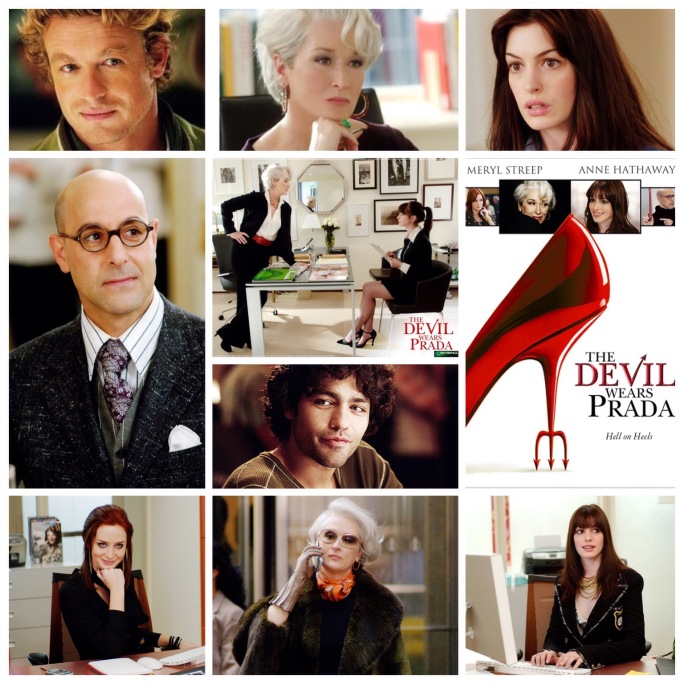
The Devil Wears Prada is an interesting one. It’s one part sincerity, two parts cynicism and possesses a certain love for each and every character within its narrative that it’s reluctant to admit to at times, perhaps jut to keep a low profile with its realism. I’ve never read the book, but the film starts off going one way and seems like it will tidy itself up in a nice little resolution, and abandons it’s comfort zone two thirds of the way through for something that cuts cuts a bit deeper. Anna Hathaway starts her arc in the adorable zone and progresses through confidence and finally arrives at in a jaded daze at a tough life lesson. She plays Andrea Sachs, a would be journalist who decides to take a detour and work as second personal assistant to Miranda Priestly (Meryl Streep) the editor and slave driver at Runway magazine, in hopes that doors will eventually open for her in her field. Not quite the breezy excursion she hoped for, as Priestly turns out to be a full on nightmare. Streep blusters into the film like an acy tornado, steady at the reigns of her character and completely owning every syllable of her delicious dialogue. Streep plays her as the ultimate boss from hell, and then cleverly shows us the woman beneath in one key scene that resonates nicely. Most of the time her personality resembles that of my fifth grade schoolteacher on a bad day, and it’s utterly hilarious to see Streep, a god amongst progessionals, go for it like a praying mantis. Andrea also comes under the scrutiny of prim Emily (Emily Blunt, excellent), Miranda’s first assistant who is aghast at her decision to hire this walking fashion disaster. Andrea quickly catches on though, holding her own with this difficult job at the expense of her relationship with her boyfriend (Adrian Grenier of Entourage). Stanley Tucci is equal parts snazzy and snooty as Nigel, Miranda’s associate and eventual mentor figure for Andrea, superb as always. Simon Baker also shows up as a hotshot who tries just a little too hard to sweep Andi off her feet. Like I said before, the film tricks you with fluff and banter and eventually ends up somewhere more serious, with a painful look at what it takes to cut it in the business world, and the allegiences which sometimes get slashed and burned in favour of covering your own ass. Ugly stuff, for sure, but necessary and honest, a decision that helps the film greatly. Plus, it’s pretty damn funny most of the time. Great stuff.
Margin Call: A Review by Nate Hill
J.C. Chandor’s Margin Call sustains a laser focused, wilfully meticulous look at the days leading up to the 2008 financial crash, showing us life within one wall street office building during a nervy period which now no doubt is remembered as the calm before the storm. Various characters in different positions of the hierarchy anxiously brace themselves as the jobs begin to get cut and the dread looms towards them like the inevitable rising sun at dawn. It’s set all in one afternoon and night, compacting a far reaching event which spanned years into the microcosm of a single 24 hour window, a tactic which sits through the larger world implications and brings it in for something a little more intimate. Zachary Quinto plays a young trader who discovers a rip in the lining of the economic infrastructure, a precursor to the eventual disaste. I’m not being purposefully vague and cryptic with that, I just don’t personally understand all the exact ins and outs of what went wrong back then, and having not the slightest knowledge of wall street jargon, that’s the best I can do. He brings this knowledge to his superiors who react in varying ways. Kevin Spacey is a disillusioned big shot who sees his life going off the rails alongside the country’s market, and mopes in his swanky office. Paul Bettany is a cocky young upstart who uses casual indifference to shade the bruises he’s got from knowing what will happen. Demi Moore is a company head who looks out for herself while others in the company. Jeremy Irons provides scant moments of humour as a bigwig fixer who arrives on a chopper to set things straight, or at least assess the damage. The best work of the film comes from Stanley Tucci (surprise, surprise) as a jilted employee who has been laid off in the confusion, and is seething about it. His melancholic monologue about what it takes to propel America’s industry and economy forward resonates with a humanity that cuts deep. The film ticks along with a pace that’s both measured and swift, with little time for introspect, yet showing it to us anyway amid the chaos. Watch for appearances from Penn Badgley, Al Sapienza, Simon Baker and Mary McDonnell as well. Chandor let’s the proceedings thrum with an inevitability that hangs in the air as the promise of the impending crisis, a feeling that serves to impart not why it happened, not how it happened, but the fact that it did happen, to each and every individual person who was affected, as opposed to the country as a whole.
